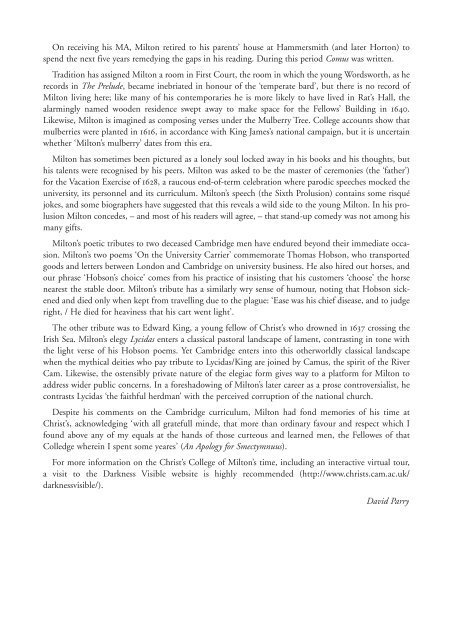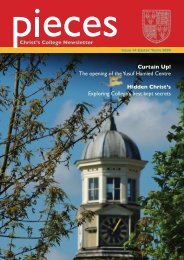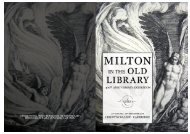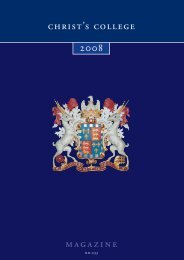here - Christ's College - University of Cambridge
here - Christ's College - University of Cambridge
here - Christ's College - University of Cambridge
You also want an ePaper? Increase the reach of your titles
YUMPU automatically turns print PDFs into web optimized ePapers that Google loves.
On receiving his MA, Milton retired to his parents’ house at Hammersmith (and later Horton) to<br />
spend the next five years remedying the gaps in his reading. During this period Comus was written.<br />
Tradition has assigned Milton a room in First Court, the room in which the young Wordsworth, as he<br />
records in The Prelude, became inebriated in honour <strong>of</strong> the ‘temperate bard’, but t<strong>here</strong> is no record <strong>of</strong><br />
Milton living <strong>here</strong>; like many <strong>of</strong> his contemporaries he is more likely to have lived in Rat’s Hall, the<br />
alarmingly named wooden residence swept away to make space for the Fellows’ Building in 1640.<br />
Likewise, Milton is imagined as composing verses under the Mulberry Tree. <strong>College</strong> accounts show that<br />
mulberries were planted in 1616, in accordance with King James’s national campaign, but it is uncertain<br />
whether ‘Milton’s mulberry’ dates from this era.<br />
Milton has sometimes been pictured as a lonely soul locked away in his books and his thoughts, but<br />
his talents were recognised by his peers. Milton was asked to be the master <strong>of</strong> ceremonies (the ‘father’)<br />
for the Vacation Exercise <strong>of</strong> 1628, a raucous end-<strong>of</strong>-term celebration w<strong>here</strong> parodic speeches mocked the<br />
university, its personnel and its curriculum. Milton’s speech (the Sixth Prolusion) contains some risqué<br />
jokes, and some biographers have suggested that this reveals a wild side to the young Milton. In his prolusion<br />
Milton concedes, – and most <strong>of</strong> his readers will agree, – that stand-up comedy was not among his<br />
many gifts.<br />
Milton’s poetic tributes to two deceased <strong>Cambridge</strong> men have endured beyond their immediate occasion.<br />
Milton’s two poems ‘On the <strong>University</strong> Carrier’ commemorate Thomas Hobson, who transported<br />
goods and letters between London and <strong>Cambridge</strong> on university business. He also hired out horses, and<br />
our phrase ‘Hobson’s choice’ comes from his practice <strong>of</strong> insisting that his customers ‘choose’ the horse<br />
nearest the stable door. Milton’s tribute has a similarly wry sense <strong>of</strong> humour, noting that Hobson sickened<br />
and died only when kept from travelling due to the plague: ‘Ease was his chief disease, and to judge<br />
right, / He died for heaviness that his cart went light’.<br />
The other tribute was to Edward King, a young fellow <strong>of</strong> Christ’s who drowned in 1637 crossing the<br />
Irish Sea. Milton’s elegy Lycidas enters a classical pastoral landscape <strong>of</strong> lament, contrasting in tone with<br />
the light verse <strong>of</strong> his Hobson poems. Yet <strong>Cambridge</strong> enters into this otherworldly classical landscape<br />
when the mythical deities who pay tribute to Lycidas/King are joined by Camus, the spirit <strong>of</strong> the River<br />
Cam. Likewise, the ostensibly private nature <strong>of</strong> the elegiac form gives way to a platform for Milton to<br />
address wider public concerns. In a foreshadowing <strong>of</strong> Milton’s later career as a prose controversialist, he<br />
contrasts Lycidas ‘the faithful herdman’ with the perceived corruption <strong>of</strong> the national church.<br />
Despite his comments on the <strong>Cambridge</strong> curriculum, Milton had fond memories <strong>of</strong> his time at<br />
Christ’s, acknowledging ‘with all gratefull minde, that more than ordinary favour and respect which I<br />
found above any <strong>of</strong> my equals at the hands <strong>of</strong> those curteous and learned men, the Fellowes <strong>of</strong> that<br />
Colledge w<strong>here</strong>in I spent some yeares’ (An Apology for Smectymnuus).<br />
For more information on the Christ’s <strong>College</strong> <strong>of</strong> Milton’s time, including an interactive virtual tour,<br />
a visit to the Darkness Visible website is highly recommended (http://www.christs.cam.ac.uk/<br />
darknessvisible/).<br />
David Parry





